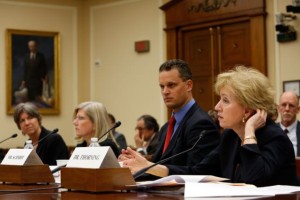 Washington, DC – The U.S. Intended Nationally Determined Contribution (INDC) to the United Nations Framework Convention on Climate Change (UNFCCC) raises many questions related to international commitments and concerns over the impact on the U.S. economy. Cost/benefit analysis should guide any policy related to climate change., according to American Council for American Council for Capital Formation Senior Vice President and Chief Economist Margo Thorning. Thorning offered her views today at a hearing of the U.S. House Committee on Science, Space and Technology.
Washington, DC – The U.S. Intended Nationally Determined Contribution (INDC) to the United Nations Framework Convention on Climate Change (UNFCCC) raises many questions related to international commitments and concerns over the impact on the U.S. economy. Cost/benefit analysis should guide any policy related to climate change., according to American Council for American Council for Capital Formation Senior Vice President and Chief Economist Margo Thorning. Thorning offered her views today at a hearing of the U.S. House Committee on Science, Space and Technology.
Thorning questioned the likelihood of reduced fossil fuel generation in exchange for more expensive renewable energy sources in many developing nations at the same time that global energy demand is projected to grow by 37 percent by 2040. She also pointed to the challenge for the U.S. to reach previously announced emission targets by 2020 that were even lower than those proposed in the INDC. Last, how will implementation of regulations to achieve those targets impact the U.S. economy?
“Policymakers need to balance environmental goals with the need to promote strong economic growth. They must consider the potential impact of regulations implementing the INDC since the U.S. economic recovery remains weak. Real GDP growth has averaged only 1.1 percent since 2008 and the number of discouraged workers who have dropped out of the work force is large. Wage growth has also fallen behind that of previous recoveries,” Thorning said.
Thorning underscored several alternative policies that could help strengthen the U.S. economy as well as slowing global CO2 emission growth. Federal tax reform, which allows expensing for all new investment, would stimulate economic growth and pull through cleaner less emitting technology. Encouraging the export of U.S. LNG and clean coal technology to developing countries would strengthen the economy and slow the growth of global emissions. The consistent use of cost/benefit analysis to review existing regulations and analyze proposed regulations would also strengthen the economy.
“The prudent path for U.S. policymakers to reduce CO2 emissions is to focus on strengthening the U.S. economy through tax and regulatory reforms. The consistent use of cost/benefit analysis to review existing regulations and analyze proposed regulations would also strengthen the economy,” Thorning concluded. “A stronger U.S. can adapt to a changing climate if necessary. In addition, the U.S. should encourage LNG exports and the transfer of clean coal technology to help other countries develop while emitting fewer GHGs.
Read Dr. Margo Thorning’s Full Testimony: http://accf.org/wp-content/uploads/2015/04/ACCF-testimony-April-15-2015-FINAL.pdf
Founded in 1973, The American Council for Capital Formation (www.accf.org) is a nonprofit, nonpartisan economic policy organization dedicated to the advocacy of pro-growth tax, energy, environmental, trade and economic policies that encourage saving and investment.






